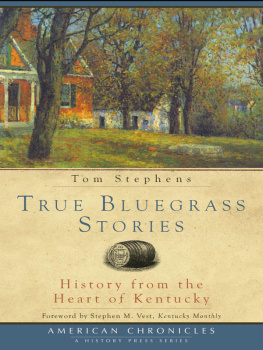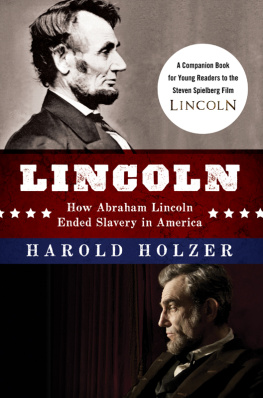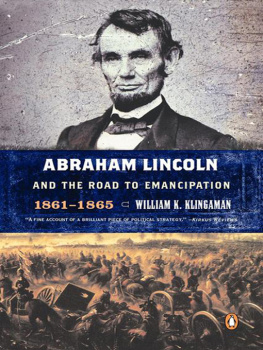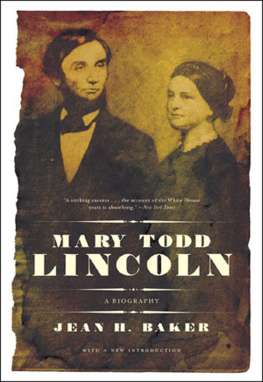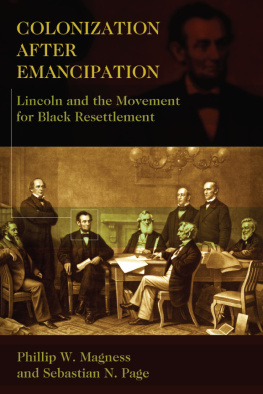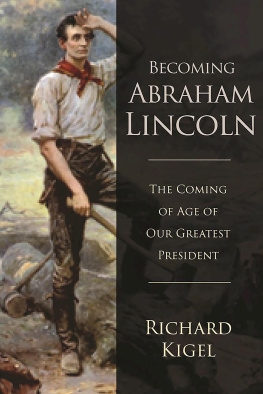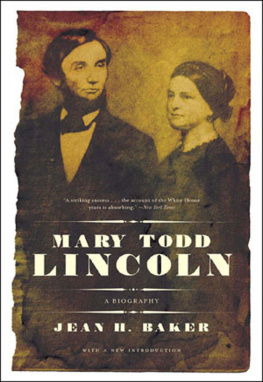Originally published in 1955 by The University of Kentucky Press
This edition published by The University Press of Kentucky
Scholarly publisher for the Commonwealth,
serving Bellarmine University, Berea College, Centre
College of Kentucky, Eastern Kentucky University,
The Filson Historical Society, Georgetown College,
Kentucky Historical Society, Kentucky State University,
Morehead State University, Murray State University,
Northern Kentucky University, Transylvania University,
University of Kentucky, University of Louisville,
and Western Kentucky University.
All rights reserved.
Editorial and Sales Offices: The University Press of Kentucky
663 South Limestone Street, Lexington, Kentucky 40508-4008
www.kentuckypress.com
Library of Congress Cataloging-in-Publication Data
Townsend, William H. (William Henry), 18901964.
Lincoln and the Bluegrass: slavery and civil war in Kentucky / by
William H. Townsend.
p. cm.
Bibliography: p.
Includes index.
ISBN 0-8131-1687-2
1. Lincoln, Abraham, 18091865Views on slavery. 2. Slavery
KentuckyHistory19th century. 3. KentuckyHistoryCivil War,
18611865. I. Title.
E457.T78 1989
973.7'092'4dc19 88-36669
CIP
ISBN-13: 978-0-8131-0196-5
This book is printed on acid-free recycled paper meeting
the requirements of the American National Standard
for Permanence in Paper for Printed Library Materials.
Manufactured in the United States of America.
| Member of the Association of
American University Presses |
Preface
TO THE 1955 EDITION
IT HAS been more than twenty-five years since Lincoln and His Wifes Home Town, from which the present work has developed, first came off the press. During this period I have had the benefit of important and relevant sources which were either unknown or unavailable in 1929. The Abraham Lincoln Association of Springfield, Illinois, has assembled The Collected Works into eight large volumes which contain hundreds of Lincoln letters and documents heretofore unpublished. The Herndon-Weik manuscripts and the Robert Todd Lincoln Collection are now open for inspection and research in the Library of Congress. The diaries of the Reverend William Moody Pratt, a veritable gold mine of information about Lexington and the Bluegrass from 1833 until long after the Civil War, are in the Library of the University of Kentucky. Diligence and luck have added to my own collection of Lincolniana many items which have proved useful in the present undertaking. As before, whenever possible I have allowed original sources to speak for themselves.
It is my opinion that the analysis of this new material affords a broader perspective and deeper insight into the affirmation made in the preface to the earlier bookthat Abraham Lincolns personal contacts with slavery in the Bluegrass gave him a firsthand knowledge of the peculiar institution that he could have acquired in no other way. The impact of these experiences upon Abraham Lincoln and the circumstances surrounding them can hardly be more aptly stated than in the following paragraphs of that preface.
Lexington lay in the heart of the largest slaveholding section of Kentucky. Here in the far-famed Bluegrass region, with its chivalry and romance, its culture and traditions, the various aspects of African bondage were fairly and accurately presented. Here the future Emancipator saw vexatious problems and the difficulties of their solution from the Southerners own viewpoint. Here, also, the fires of antislavery agitation burned fitfully but furiously, giving Lincoln, as he said, his first real specific alarm about the institution of slavery.
Lincolns well-known conservatism on the dominant question went a long way toward making him the nominee of the Republican party for President in 1860. It brought to him the powerful support of the Border States delegates who believed that he possessed a sympathetic understanding of their problem and could deal with it better than any other candidate before the convention. During the anxious days following his election, as the nation drifted steadily into Civil War, the new President was gravely aware of the importance of Kentucky in the approaching conflict. I think to lose Kentucky is nearly the same as to lose the whole game, he wrote Senator Browning. Lincoln also realized that the first danger of secession in Kentucky centered about the capital city of the Bluegrass, and in the succeeding pages we shall see how desperately the struggle was waged in that section and how eventually the state was saved to the Union.
Here, near the borderland of freedom, domestic ties were rent asunder, brother against brother, father against son, the whole social structure crumbling in the vast upheaval. Throughout those dark, bitter, tragic days, Lincoln never lost contact with Kentucky. Always she and her citizens, even those arrayed in arms against the government, were the objects of his patient solicitude.
In the laborious task of locating and assembling material, it has been my good fortune to have the constant and capable co-operation of various public institutions, as well as the active assistance and kindly interest of many individual friends. Among the former, I must thank the Lexington Public Library, Transylvania College Library, University of Kentucky Library, the Filson Club, Louisville Free Public Library, Kentucky State Historical Society, Library of Congress, Wisconsin Historical Society, Abraham Lincoln Foundation, State University of Iowa Library, Illinois State Historical Library, and the Department of Lincolniana of Lincoln Memorial University.
Among the latter, my warmest thanks and appreciation are due to Clyde Walton, Iowa City, Iowa; Irving Stone, Beverly Hills, California; Ralph Newman and Mrs. Foreman M. Le-bold, Chicago, Illinois; Mrs. Philip B. Kunhardt, Morristown, New Jersey; Bruce Catton, New York City; Donald M. Hobart, Philadelphia, Pennsylvania; Percy C. Powell and David C. Mearns, Washington, D. C.; R. Gerald McMurtry, Harrogate, Tennessee; Louis Warren, Fort Wayne, Indiana; Mrs. Lewis C. Williams, Evanston, Illinois; Holman Hamilton, Hambleton Tapp, Miss Jacqueline Bull, Miss Roemel Henry, Miss Virginia Hayes, Joe Jordan, Mrs. Louis Lee Haggin, Louis Lee Haggin, II, and Dr. Josephine Hunt, Lexington, Kentucky.
Mrs. Martha B. Cheek, wife of Professor Frank J. Cheek, Jr., of the University of Kentucky, a great-great-niece of Denton Offutt, has generously made available to me the voluminous records accumulated by her through long years of research concerning the Offutt family.


